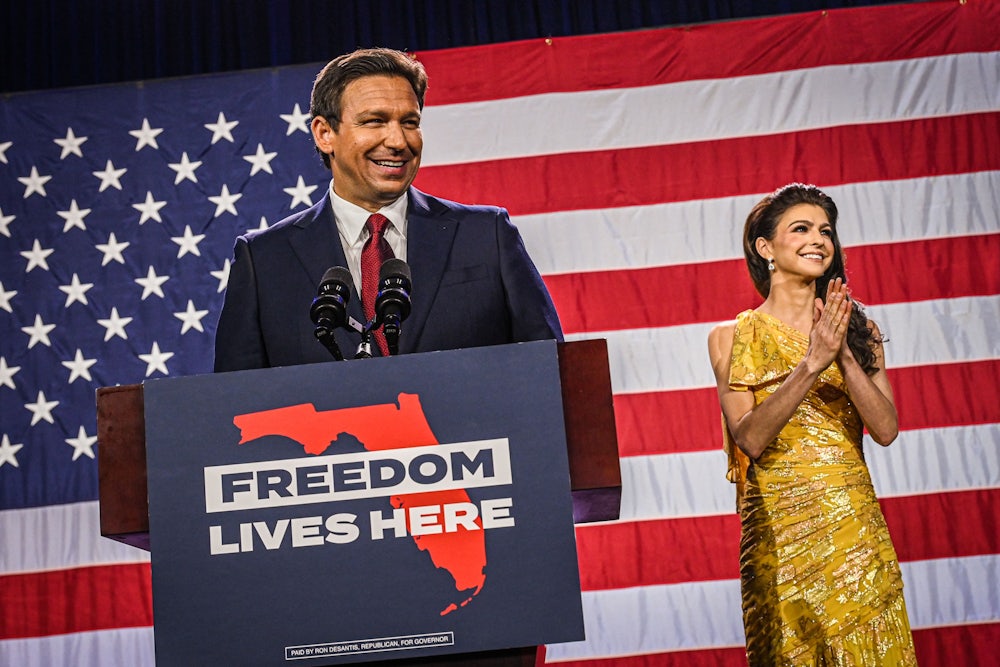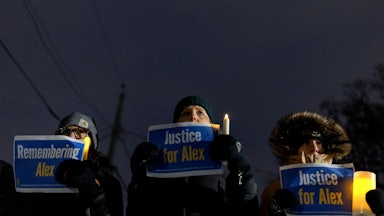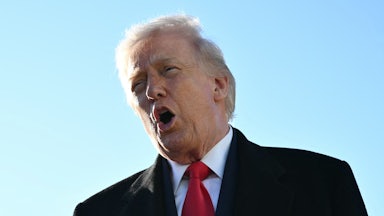The conservative attacks on public education in Florida have become ever more extreme under Governor Ron DeSantis. Now they’re also becoming so absurd and so totalizing that they forbid taking a stand on them in any direction. It would be a fantastic act of satire were it not also so dangerous.
Back in May, DeSantis signed into law Senate Bill 266, banning the state’s public colleges and universities from using public funds to “advocate for diversity, equity, and inclusion, or promote or engage in political or social activism.” But the law, which took effect in July, never defined those terms, instead leaving that up to the Board of Governors that oversees those state schools. Now the board has done just that. In draft regulation obtained by The Chronicle of Higher Education, the board proposes that the ban apply to all campus programs and activities in which the college or university “endorses or promotes a position” on “topics that polarize or divide society among political, ideological, moral, or religious beliefs, positions, or norms.”
As University of South Florida general counsel Gerard Solis said, in a faculty senate meeting last week, “I can’t think of anything that doesn’t” polarize society along those lines. Should the board—which is composed mostly of DeSantis appointees—approve the proposed language, Florida’s public colleges and universities will be gagged so sufficiently that discussion of DeSantis’s sputtering run for president might not be permitted on campus. DeSantis is hoping to produce an environment in which his opponents second-guess how or even if they can speak out. In fact, the regulation appears to even prohibit those on campus who have received public funding from either supporting or opposing the regulation itself.
The proposed regulation is of a piece with similar moves by Florida Republicans—most famously, the “Don’t Say Gay” law and the Stop Woke Act—that are designed to be enforced not so much by the authorities as through a chilling effect in the classroom. They are also part of DeSantis’s ongoing self-branding exercise in destroying public education. “Student groups advocating for social issues that directly impact them, such as university funding, free-speech rights, and even religious freedom will be stripped of all support, while faculty will be intimidated into not sponsoring such groups on campus,” said Andrew Gothard, president of the United Faculty of Florida union.
Under S.B. 266, Florida’s public colleges and universities are prohibited from offering general education classes that “distort significant historical events or include a curriculum that teaches identity politics” or that include “theories that systemic racism, sexism, oppression, and privilege are inherent in the institutions of the United States and were created to maintain social, political, and economic inequities.” The law also bars public higher education institutions from using state or federal funds for activities or programs that “advocate for diversity, equity, and inclusion”—making Florida’s anti-DEI law one of the most restrictive of the dozens of such laws introduced across the United States. A DeSantis press release announcing the bill’s signing declared it is meant to “prevent woke ideologies from continuing to coopt our state universities and state colleges.”
Now it’s up to the Board of Governors to fulfill the governor’s vision by defining the terms in the law. The draft regulation is just as broadly conceived as the aforementioned law. In addition to defining “social issues” as “topics that polarize or divide society among political, ideological, moral, or religious beliefs, positions, or norms,” it defines “political or social activism” as “any activity organized with a purpose of effecting or preventing change to a government policy, action, or function, or any activity intended to achieve a desired result related to social issues, where the university endorses or promotes a position in communications, advertisements, programs.” “Diversity, equity, or inclusion,” meanwhile, “is any program, activity, or policy that promotes differential or preferential treatment of individuals, or classifies such individuals on the basis of race, color, sex, national origin, gender identity, or sexual orientation.”
The draft language is being circulated to public universities for comment ahead of the board’s November 8 and 9 meetings, with final approval expected in January. In the meantime, the law that mandated the regulation is headed for a court date.
Consider the scene back when DeSantis signed S.B. 266. The ceremony was held at the New College of Florida, a public liberal arts college that was forced to alter its curriculum and programs in accord with the governor’s mandates. DeSantis is taking pride in systematically remaking the school, which has a long history of protest, in his own image. In January, he installed conservative ideologue and education foe Christopher Rufo as a member of the college’s board of trustees. During the bill signing in May, Rufo mocked the student protesters who could be heard outside. In August, with New College having lost more than a third of its faculty ahead of the fall semester, DeSantis hailed the “replacement of far-left faculty with new professors aligned with the university’s mission.”
But he wasn’t able to purge the school entirely of dissent, apparently: That same month, a group of New College faculty and students filed a legal challenge to S.B. 266, and on Monday a federal judge heard arguments in their case. He’s the same judge who, last year, ruled that the Stop Woke Act was unconstitutional.










